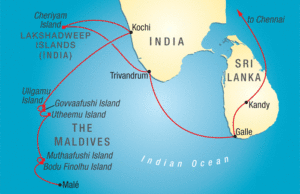
By Asanga Abeyagoonasekera* 30 September 2018
“The age of the west is at a crossroads, if not at an end” Peter Frankopan
The expertise of a country’s diplomats and the effectiveness of its armed forces are not the only variables determining its rise. Geographical factors must also be considered. Influencing the overall prosperity of a nation are its access to raw materials and trade routes, its climate, and – most critical in informing foreign policy – its strategic location.
In this light, it was no coincidence that the French Emperor Napoleon Bonaparte commissioned the translation of the works of the ancient geographer Strabo. The ‘subordination’ of Asian countries to Western powers began in 1798 when Napoleon led a 40,000-strong French army into Egypt, ostensibly to protect French trade interests. Shortly afterward, issues concerning trade resulted in Western countries driving a wedge between China and India. Economic interests have similarly followed military interests on several occasions in the arc of history, and history could repeat itself. This time, though, the difference will be an Eastern power as the most significant player in the global arena.
Southern Sri Lanka has become a geopolitical hotbed after the construction of the Hambantota harbour and the recent relocation of the Galle Southern Naval Command next to Hambantota Port. There are more than 700 naval officers engaged in maritime security efforts who are based next to the harbour premises leased by China. The relocated post in Galle will be occupied by the Sri Lankan coast guard to further protect the oceans using its new military hardware. In doing so, scholars have suggested that Sri Lanka should opt for the P-3C Orion naval reconnaissance anti-submarine aircraft instead of Offshore Patrol Vessels (OPVs). This aircraft enables scanning a larger area and has been proven effective by many other countries. According to the latest statement by Prime Minister Wickramasinghe, Sri Lanka should prepare for anti-submarine warfare.
On a recent visit to the port of Hambantota, the Japanese Defence Minister, Itsunori Onedera, stated, “Despite the lease there was an agreement that the port remains free of military activities.” This statement reflects concerns over the leasing of the facility to China for 99 years. Onedera was the first Japanese defence minister to visit Sri Lanka in a period in which the island finds itself in the spheres of influence of India, the US, and China. Unfortunately,the expectation that Hambantota should remain free of Chinese military activities – as well as the other details of the lease agreement– has received little attention from the general public of Sri Lanka.
China’s geopolitical presence is rapidly expanding under the aegis of the Belt and Road Initiative (BRI). Starting with ports such as Sittwe, Gwadar, Djibouti, Hambantota, and Dar es Salaam, China is testing a strategy of using its economic influence to advance its security interests, much like Western powers have done in the past. To counter China’s influence through BRI, the ‘Quad’ (the US, India, Japan, Australia) was formed.
It has been argued that Sri Lanka has benefited from Japan’s hedging strategies in the South Asia region. A tactic that could unfold into a larger strategy was the agreement signed on 12 April 2017 aimed at the ‘Deepening and Expansion of Comprehensive Partnership between Japan and Sri Lanka’. The agreement covers three areas: First, Japan is to expand its maritime cooperation with Sri Lanka; second, Japan is to improve Sri Lanka’s maritime capability by providing two OPVs in support of the bilateral defence partnership; and third, Sri Lanka is to participate as an observer in the next Japan-India joint exercise between coast guards. New alliances such as with Sri Lanka will further support and cement the core strategy between the US and Japan in the Indo-Pacific.
Djibouti is a former French colony with a small population and scarce natural resources. The country’s GDP remains below US$ 1.8 billion and it has only one significant geopolitical offering: its strategic location. Sitting at the eastern edge of the African continent and the western shore of the Indian Ocean, Djibouti has become a multi-military base and logistics operational hub. Even Japan’s first overseas military base since World War II is found in this strategic location. Within Djibouti, a Chinese logistics base also sits merely eight miles away from Camp Lemonnier. There are 4,000 personnel from the US Combined Joint Task Force stationed in the Horn of Africa. From a realist lens, of the various countries who have leased property for military bases, China has a strategic advantage due to the billions of dollars of financial support it has offered continuously to Djibouti. One example is an infrastructural mega-project in the form of a railway connecting Djibouti and Ethiopia.
Outside powers pledging non-interference to the region and neighboring countries has significant economic and military implications. Other new ports emerging in the region could copy Djibouti’s model in the years to come. Sri Lanka is not unique in this sense. Currently, Sri Lanka’s Trincomalee Port is planned to be jointly developed by India, Japan and Singapore; Hambantota Port is already leased to China, and the adjoining Mattala Airport will be operated by India, all in a bid to counter-balance China’s influence. Merely moving a Sri Lankan naval post next to the plot leased by China for 99 years will not guarantee the ability to secure economic or military interests in the future.
Fluctuations in the frequency, scope, and intensity of diplomatic and military engagements are inherent to a volatile, multipolar world. China’s rise, made possible by its economic advances, is seen by many observers also as a result of it winning every move on the geopolitical chess board. Djibouti was the initial victory in the Indian Ocean and presumably, other small states will give in to this tide.
* Views expressed are the author’s own, article was initially published by the IPCS, New Delhi
